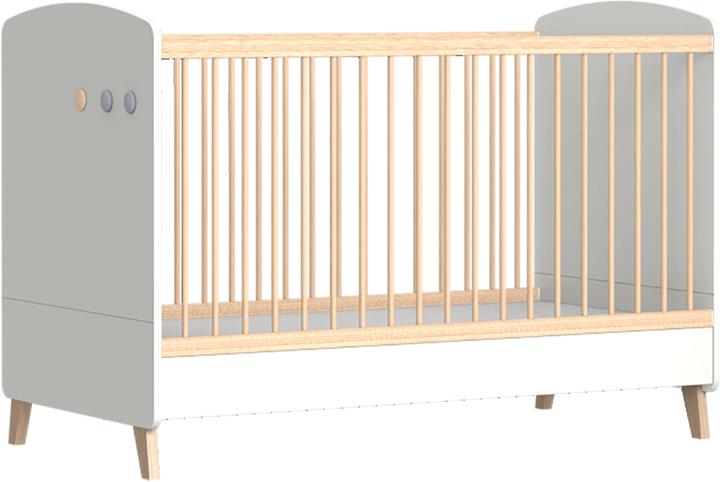

When is the perfect time to put the sleeping child down?
The child has finally dozed off and you put him in his cot. A short time later, he is awake again and the party starts all over again. What this phenomenon is all about and what role a cot plays in it.
You carry and rock your child through the nursery for at least a thousand steps until they finally fall asleep. But as soon as you put him in his cot, he opens his eyes again. So you pick him up, continue your walk and wait longer this time to make sure he is sleeping soundly and relaxed. But nope, soon it wakes up again and calls for you.
When the heck is the best time to put your sleeping child down?

Source: Buzzfeed
There isn't one, that's the bad news. The good news is that the "little game" is neither unusual nor worrying. It is part of everyday life in many families.
This is a "completely natural and competent attachment behaviour", emphasises child sleep coach Tilja Tanner. It's probably just that the child repeatedly experiences suddenly lying alone in its cot just when it relaxes, lets go and dozes off. "When a child is put down to sleep, it's a bit like falling asleep on the sofa and then waking up in your bed. It unsettles you and you wonder what exactly has happened."
Lay down while the child is still awake
Sleeping always means a separation from your own consciousness - and from your carers. In terms of evolutionary biology, it has always been safest to sleep in the protection of the community. In prehistoric times, children who were laid down somewhere and then slept peacefully would soon have fallen victim to wild animals. "But young children don't realise that today we no longer have to worry about being surprised by a sabre-toothed tiger in our sleep," explains Tanner.
In addition, children only know at around nine months - with so-called object permanence - that mum and dad are still there even if they cannot perceive them through their senses.
With this in mind, it is clear when it is best to put a child down: not asleep, but while they are still awake. So that it knows where it falls asleep. And wakes up there too.
In small steps to the big task
The child should therefore learn to fall asleep in the place where they will sleep later. And that means lying down. Parents know: a mammoth task. For most babies and toddlers, it is safest to fall asleep in their parents' arms, at least close to them - and certainly not to be laid down awake. Especially not alone in a cot in their own room, where physical contact is hardly possible.
So how do you get there as parents? "Step by step", explains Tilja Tanner. However, there are various options and no patent remedy. As is so often the case, analysing the sleep rhythm is the first step. If a child is to learn something new, it is important to know the right time to fall asleep. And then: build trust. "I recommend first stabilising the sleep situation together in the bond with the child and then moving towards more independence." This is possible from around six months.
Sleep is a regulatory situation - so the question is how you can help the child to control their own sleep step by step and according to their age. "For example, by the parents first creating a sleeping area where they can fall asleep lying down with the child." Then the support should be reduced until the child can also fall asleep lying next to the parents. "For many children, falling asleep independently in their own bed is only possible once they have already gained experience of falling asleep without direct physical contact."
To do this, they need positive experiences to understand that sleeping is a safe state. "That's why it makes perfect sense to carry a baby a lot, to sleep together with them and to give them the experience that sleeping is safe and that falling asleep is very easy," says the expert. "Independence is based on trust. And trust comes from many positive experiences."
Crib yes, but...
At least in the first year and beyond, many children sleep better in the presence of their parents. Whether this is in a floor bed, a family bed, a co-sleeper or in their own cot in their parents' room: "There's no right or wrong. The important thing is that everyone feels comfortable with the situation." Even a cot can make sense, says Tilja Tanner. For example, if one side of the cot can be removed. "This gives you the option of placing it next to the parents' bed as a large extra bed as a first step. And at the same time, the child can gain their first experience with their own cot."
But when should the children gradually fall asleep without parental support? Here too: According to Tilja Tanner, there is no perfect time. In the end, it has to be right for each individual family. "At two and a half and five and a half years old, my boys fall asleep on their own in their bed every night - with us present," she says. "We all enjoy it so much!"
This article is part of a multi-part series with Tilja Tanner on the topic of children's sleep. Do you have any comments or questions that you would like to clarify in the upcoming articles? Let us know in the comments or send me an email.
The following articles have already been published:
Mom of Anna and Elsa, aperitif expert, group fitness fanatic, aspiring dancer and gossip lover. Often a multitasker and a person who wants it all, sometimes a chocolate chef and queen of the couch.







